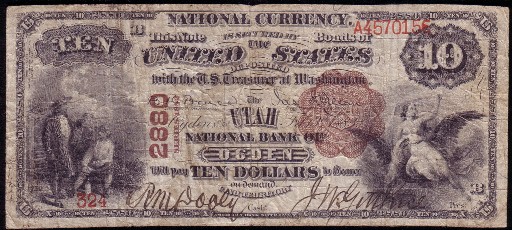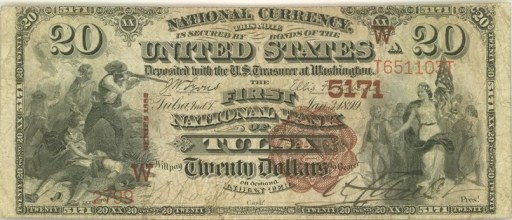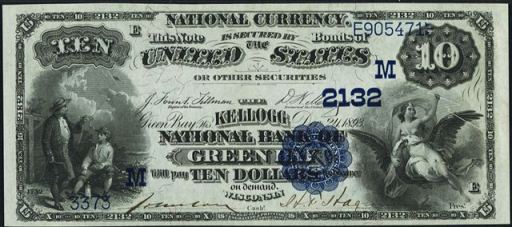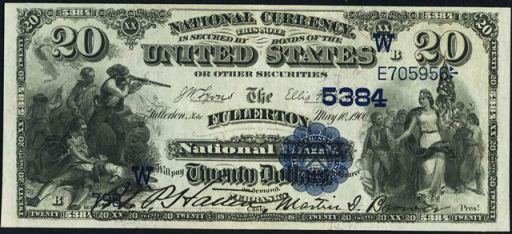The First National Bank Of Wakita
The First National Bank Of Wakita in Oklahoma printed $70,600 dollars worth of national currency. A production number that low doesn’t save room for many survivors. Currency from this bank will be rare. This national bank opened in 1901 and stopped printing money in 1909, which equals a 9 year printing period. That is obviously a very short period of time. During its life, The First National Bank Of Wakita issued 4 different types and denominations of national currency. We have examples of the types listed below. Your bank note should look similar. Just the bank name will be different. For the record, The First National Bank Of Wakita was located in Grant County. It was assigned charter number 5982.
We buy all national currency. Please call or email us for a quote. Sales@AntiqueMoney.com
The First National Bank Of Wakita in Oklahoma issued 1,350 sheets of $10 1882 territorial brown back national bank notes. A total sheet output in the lows 1,000s is a great sign that you own a very rare bank note. The ten dollar 1882 territorial brown back was printed by more than 200 national banks, and more than 200 pieces are known to exist today. That number tends to go up by a handful each year as more are discovered. Often times the $10 territorial was the first and lowest denomination a bank received. About a dozen #1 specimens are held by collectors today, and there are probably many more still held by descendants of early pioneer bankers. Territorial bank notes are the cream of the crop when it comes to national bank notes. Most are at least rare and some can be very valuable. As always, the exact value is still based on bank of issue and condition. Something ugly from Oklahoma might only be worth $3,000, but other examples could be worth well over $10,000.
Series of 1882 $10 Territorial Brown Back
The First National Bank Of Wakita printed 1,350 sheets of $20 1882 territorial brown back national bank notes. That number also represents the total number of twenty dollar bills printed for the type. Whether you have a ten or a twenty dollar territorial brown back, you should work with an expert to establish the value. Twenty dollar notes from this series were only printed at the rate of one to three compared to tens, but sadly, $20 1882 brown backs really don’t command a premium for their extra rarity. Only around fifty are known to exist today.
Series of 1882 $20 Territorial Brown Back
The First National Bank Of Wakita also printed 62 sheets of $10 1882 blue seal national bank notes. 1882 blue seals are traditionally not the most popular national bank notes. However, when we are talking about such a low print number, these become much more desirable. All of these notes say series of 1882 but they were actually printed between 1908 and 1921. So they aren’t quite as old as the dates might suggest. There is also a date on these notes that is between 1888 and 1901. That date is written in cursive text and it represents when the bank was chartered or re-chartered. Some of the so called 1882 value back notes have a chance to be really rare. Most of the earlier notes that say 1882-1908 on the back are likely going to be relatively common. The designs are exactly the same on the front. Each has a blue seal and charter number.
1882 Blue Seal $10 National Bank Note
The First National Bank Of Wakita also printed 62 sheets of $20 1882 blue seal national bank notes. That is the same number of sheets as the ten dollar denomination. You don’t have to multiply by three to get the exact number of notes issued though. There was only one twenty dollar bill per sheet. As with any national bank note, the exact value is still based on the condition, serial number, and bank of issue.
1882 Blue Seal $20 National Bank Note



